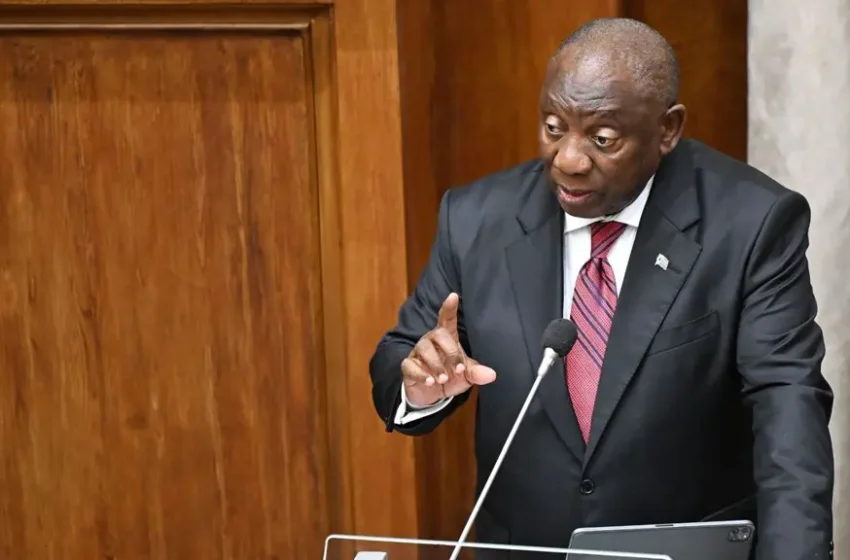Gauteng shakes up crime fight: Why Lesufi is turning ‘AmaPanyaza’ Wardens into traffic officers

South African President, Cyril Ramaphosa
The Gauteng government has announced plans to phase out the province’s controversial Crime Prevention Wardens, popularly known as AmaPanyaza, converting them into provincial traffic officers over the next three years.
Premier Panyaza Lesufi made the announcement during a media briefing on Wednesday, confirming that the 8,800 wardens currently on the government’s payroll will be withdrawn in stages and sent to accredited training colleges for reorientation and redeployment.
According to Lesufi, the decision aims to strengthen law enforcement capacity while resolving the legal and operational controversies that have dogged the unit since its creation. “I’ve had to answer questions before the Public Protector, Parliament, and even visit hospitals where wardens are being treated for gunshot wounds because they lack protection,” he said, emphasizing that his focus remains on combating crime, not political disputes.
The move represents a major shift in the province’s public safety strategy. While the initiative originally sought to complement the South African Police Service (SAPS) in high-crime communities, it has long been criticized for its ambiguous mandate, inadequate training, and questionable legality.
From Public Safety Force to Policy Headache
When AmaPanyaza was introduced, it was hailed as an innovative response to Gauteng’s surging crime rates and unemployment crisis. The wardens were deployed across townships, informal settlements, and hostels to bolster community policing and create job opportunities for young people.
However, the project soon faced a barrage of criticism. Questions arose over whether the wardens were legally recognized under the Police Act. Even though former Minister of Justice and Correctional Services Ronald Lamola had, in December 2023, designated the wardens as peace officers under Section 334 of the Criminal Procedure Act, many experts—including SAPS KwaZulu-Natal Commissioner Lt. Gen. Nhlanhla Mkhwanazi—challenged the legitimacy of that status, describing the unit as “illegal.”
This legal uncertainty, coupled with limited training and inadequate equipment, left many wardens vulnerable to attack while on duty. Reports emerged of wardens being shot at during operations, with minimal backup or institutional protection.
A Course Correction or Quiet Admission of Failure?
While the provincial government insists that retraining the wardens as traffic officers will enhance their utility and sustainability, critics argue the decision amounts to an admission of failure. Political parties such as ActionSA have described the transition as proof of poor governance and mismanagement.
“The idea was noble,” the party said in a statement, “but the lack of clear structure, oversight, and legal grounding doomed it from the start.”
ActionSA has since called for an independent audit into the programme’s finances, recruitment, and oversight, as well as a transparent plan for the retraining and reassignment process. The party also wants accountability for what it terms “a costly and failed experiment.”
Despite the criticism, Lesufi maintains that the mandate remains unchanged—fighting crime and maintaining order in Gauteng. However, as the AmaPanyaza transformation unfolds, many are asking whether this rebranding will genuinely improve safety or merely shift the crisis from one department to another.
The people of Gauteng, weary of insecurity and political theatrics, are watching closely. For them, the question is simple: will this change deliver safer streets—or just another headline?
FAQ
1. Who are the Crime Prevention Wardens (AmaPanyaza)?
They are community-based officers recruited by the Gauteng government to assist the SAPS in crime prevention and neighborhood safety.
2. Why are they being retrained as traffic officers?
The government says this will enhance their capacity while resolving legal and operational challenges that have plagued the unit.
3. How long will the transition take?
The process will be phased over 36 months, during which groups of wardens will be sent for training.
4. Why is the programme controversial?
Critics cite poor training, lack of clarity on their powers, legal disputes about their legitimacy, and reports of unsafe working conditions.
5. What happens to wardens who don’t qualify as traffic officers?
The government has not yet clarified this, prompting calls for greater transparency in the reassignment process.

